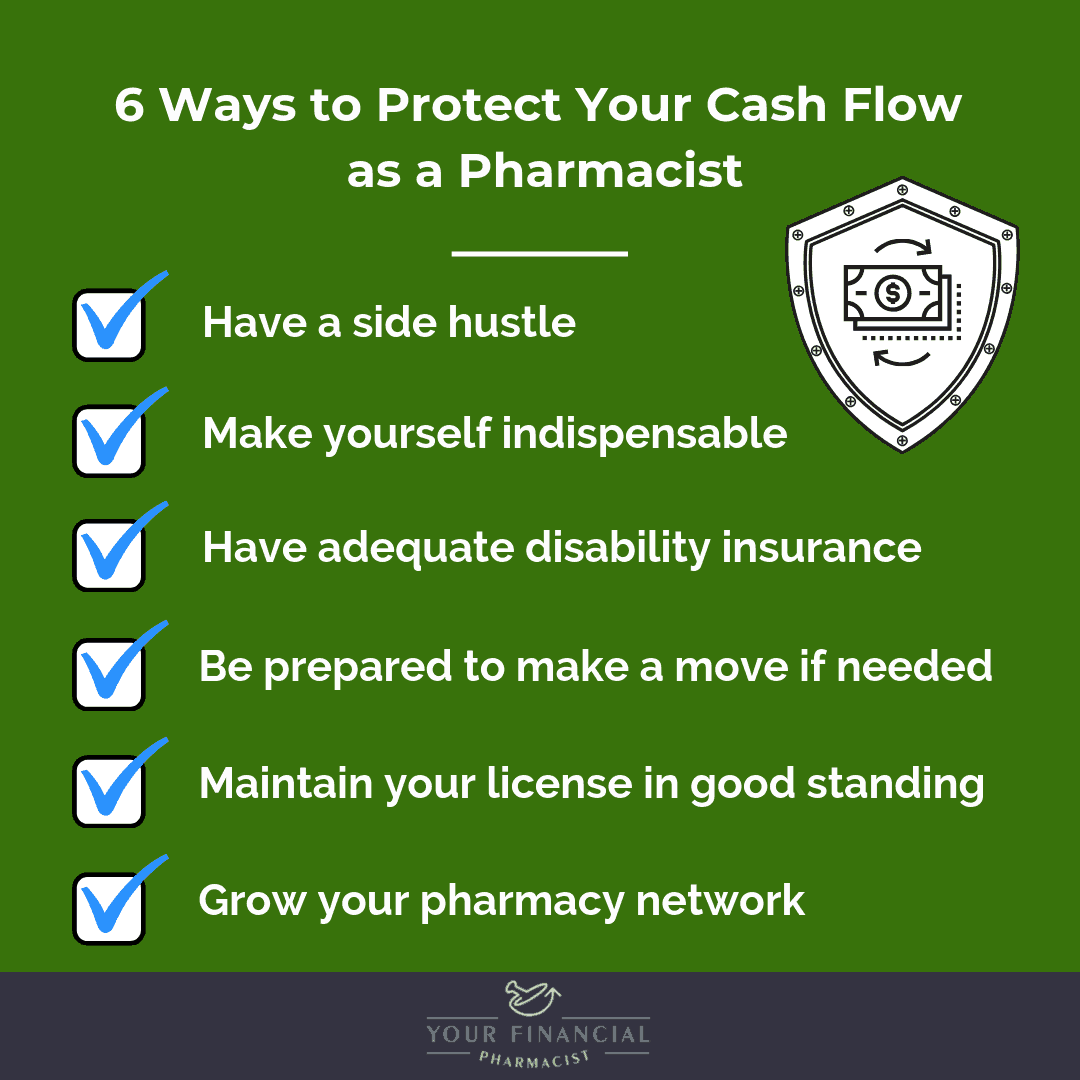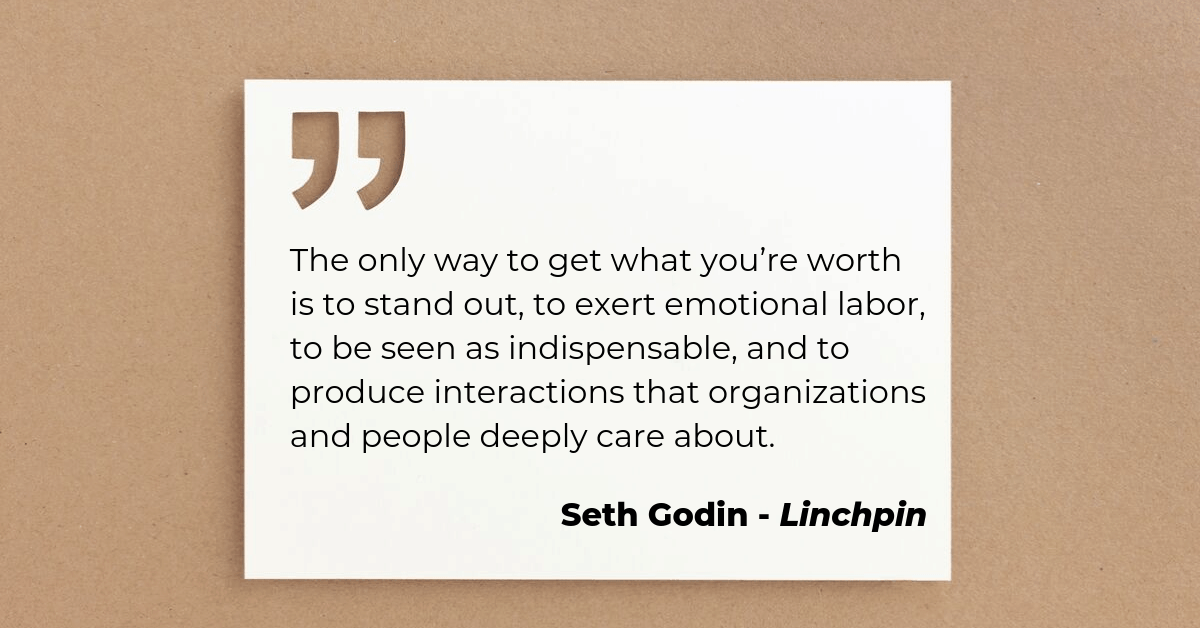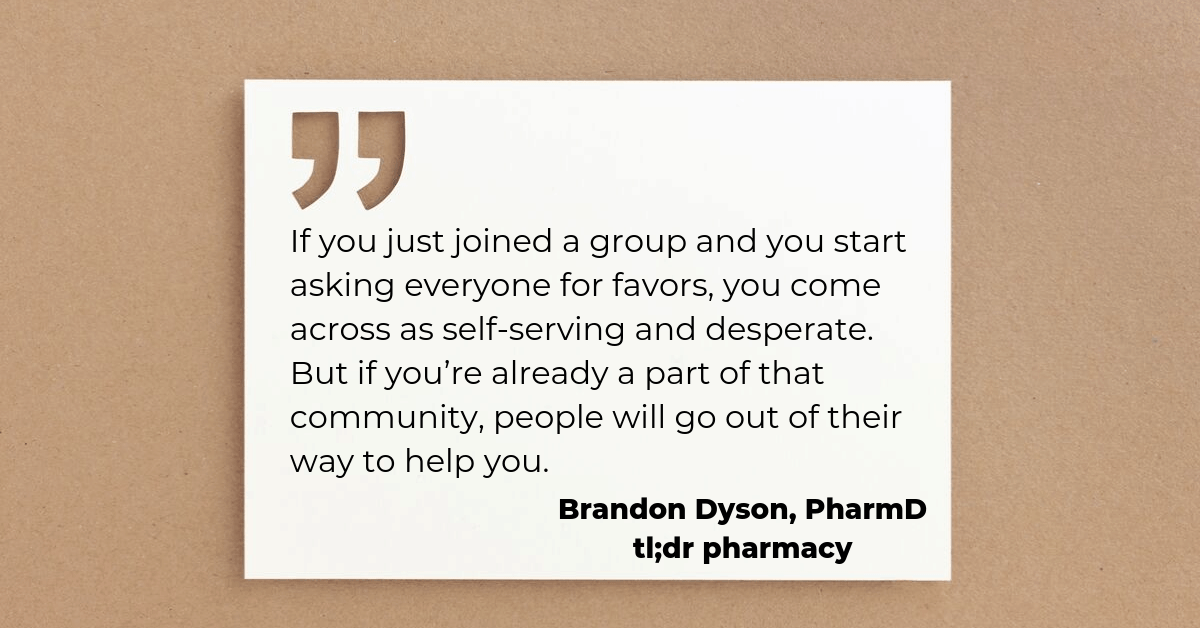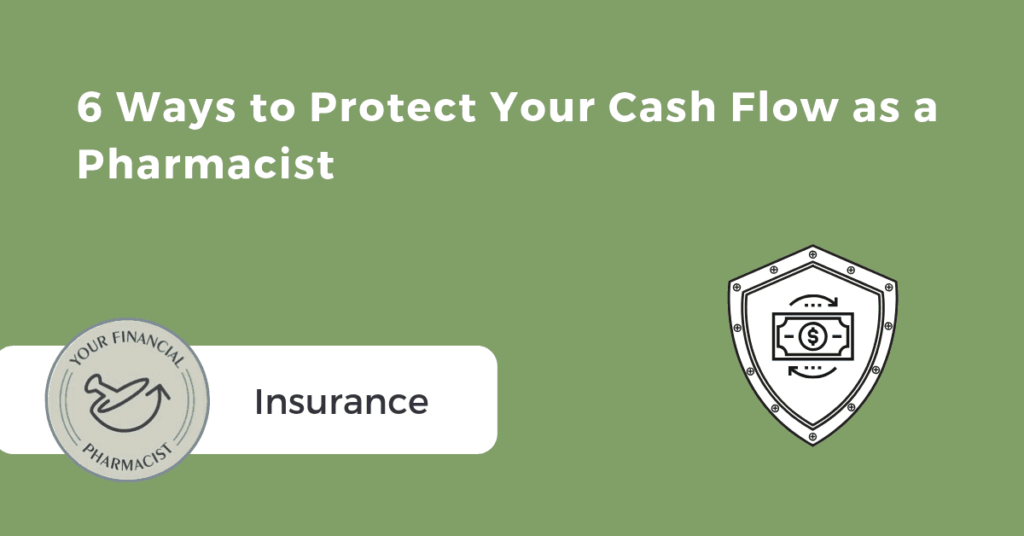6 Ways to Protect Your Cash Flow as a Pharmacist
The following post contains affiliate links through which YFP or its team members may receive compensation.
What would you do if your next paycheck wasn’t deposited?
How long could you survive if you just stopped getting paid?
If you’re a recent grad, new practitioner, or potentially even a seasoned pharmacist, the answers might look something like “use a credit card and not long.” This is especially true if you aren’t the only one who depends on your income.
Despite having a good income, it’s not that uncommon for pharmacists to live paycheck-to-paycheck. With massive student loan payments, living costs, lifestyle creep, and other priorities, unless you have substantial savings, having consistent cash flow is essential.
An emergency fund can only buy you so much time if something happens with your job. Therefore, protecting your primary means of income is key.
There are some moves you can make that can help reduce the interruption in your cash flow.

1. Have a side hustle
The most obvious way to prevent any significant change in cash flow is to have multiple sources of income. Even if you feel your job or position is relatively secure, there’s always the potential it might not be there. Unfortunately, many community pharmacists have already experienced this with large numbers of brick and mortar stores closing and the decision to downsize pharmacist presence in large companies.
By having a second or multiple income streams, you will reduce the probability of not being able to pay your bills and living expenses even if one source of income becomes affected. This could be as simple as moonlighting at another pharmacy, writing a book, or even creating a legitimate business that makes six figures a year.
If you want some ideas, check out this post 19 Ways to Make Extra Money as a Pharmacist in 2020. You can also check out the YFP podcast as we frequently have pharmacists on the show who talk about side hustles they started.
2. Make yourself indispensable
How many people do you know that work just hard enough to keep from getting fired?
There’s no question that burnout and unfulfillment run rampant in our profession, but does that mean you shouldn’t work hard, take on new challenges, and embrace opportunities?
Make it difficult to get fired.
What can you do to stand out from everyone else? What skills and knowledge can you acquire that make you a linchpin in your company or organization?
I’m not just talking about board certifications and additional credentials, but rather demonstrating the ability to solve problems or reinvent existing systems and protocols that provide value and improve outcomes.

I work in a primary care clinic with a focus on type 2 diabetes management. Most of the days are pretty full evaluating patients but I’m fortunate there are a few hours per week given to work on continuing education or to come up with ideas to improve patient care.
Taking full advantage of this time, I studied how to manage very complex diabetes patient cases such as those with suspected LADA, patients who need u-500, best practices for carb counting, and how to optimize the use of continuous glucose monitoring. This has enabled me to become a go-to resource when colleagues or other services encounter difficult cases.
In addition, I have created population management protocols to identify patients with diabetes who are not receiving guideline-directed medical therapy and those at high risk of hypoglycemia.
I then I took it a step further and created an action plan on how our team of pharmacists could intervene and set up appointments to directly impact these opportunities. Because we have been so successful, these practices have been discussed and utilized by other institutions within the organization.
None of these things I described were necessary or required of me in order to maintain good standing in my position. They were gaps and opportunities I identified that would not only improve our current practices but further my skills and value within in my role.
Even if you become a linchpin and still get let go, chances are you will be in a much better position to make a job transition and will be able to better articulate your value to prospective employers.
3. Have adequate disability insurance
With a six-figure income, you are going to have projected lifetime earnings in the millions. Besides losing your job, becoming disabled is one of the biggest potential disruptors in cash flow.
I know what you may be thinking, “As a pharmacist, something pretty bad would have to happen to me to not be able to work.” That may be true. After all, most pharmacists just require their cognitive faculties to be intact, and therefore accommodations could be made in the event of broken bones or limited mobility secondary to an accident.
Remember, you are not invincible!
The Social Security Administration predicts that more than 25% of today’s 20-year-old Americans will become disabled before the age of 67. However, almost 70% of those working in the private sector do not have disability insurance.
Beyond car accidents, think about insidious diseases like Parkinson’s disease, dementia, cancer, or MS. There are a lot of health-related scenarios that could occur at a young age and either force you out of the workplace or reduce the time you are able to work.
Disability insurance for pharmacists is really income insurance. It provides you with money in the event that you are unable to work because of an accident or illness.
Besides being able to afford typical bills such as food, mortgage, utilities, etc, think about your student loans. If you still have federal loans then you don’t have to worry because these are discharged in the event that you become permanently disabled. However, what about private loans? Or ones that you refinanced?
Therefore, unless you already have substantial wealth or have additional income streams and don’t require an income as a pharmacist to live, you need disability insurance.
Even if you have some coverage through your employer, consider an individual long term disability insurance policy. It doesn’t matter where you work or if you change jobs because it follows you and you don’t have to get another evaluation of your health status.
For a more detailed discussion on disability insurance, check out the post Disability Insurance: The Ultimate Guide for Pharmacists.
4. Be ready to make a move if needed
Motivational speaker Les Brown often says “It’s better to be prepared and not have an opportunity then to have an opportunity and not be prepared.”
What if you lost your job tomorrow? Would you be ready to start applying and submit an up-to-date polished CV? Would you be ready to interview?
It’s easy to submit your CV once and then just forget about it for years.
Brandon Dyson, pharmacist and co-owner of TL;DR Pharmacy, wrote about his experience with hiring a part-time employee at an outpatient oncology clinic. Within 6 days, he closed the posting after receiving 49 applications. Well, sort of 49. I say sort of because he mentions a number of applications were not filled out completely, were missing elements such as a cover letter, and clearly did not update their CV.
That is really unfortunate and inexcusable in our profession. Don’t eliminate yourself from the running right from the start by not following directions and being prepared. At the very least, have someone else you trust to review your application and contents if you are not 100% confident.
You can also check out Brandon’s post for more suggestions and tools for getting prepared for your next job.
5. Maintain your license in good standing
This one should go without saying: you can’t practice if you don’t have a license. Well, you can, you just may face fines or even felony charges. For most pharmacists, this means just doing the bare minimum continuing education and any other requirements.
However other situations that could affect your license and ability to practice include complaints made to your respective board of pharmacy or malpractice suits.
You know mistakes can happen. If you work for an employer, they likely offer some protection if you’re functioning within your scope of practice. However, their main concern is protecting the organization, not you.
Besides actual damages, liability or malpractice insurance can help cover litigation costs, costs for representation for board of pharmacy hearings, and lost wages. The latter is particularly important especially if you’re involved in a complicated suit that lasts months and your employer is not assisting.
Coverage is relatively inexpensive (~$12-$20/month). Proliability, Pharmacist Mutual, and HPSO offer policies for pharmacists up to $1 million in liability coverage per incident and $3 million aggregate limit.
6. Grow your pharmacy network
I was recently on LinkedIn and saw firsthand the power of and the difference between having a strong network and having a bunch of weak connections that someone blasts information to.
Whenever someone asks to connect with me, I always ask for the reason they reached out. It’s a great ice breaker and also helps to find some common ground. But what is surprising to me is that the first thing some pharmacists say to me is “I’m looking for a job and trying to expand my network.”
Now there’s nothing wrong with that, but there is usually no attempt to learn more about me, what I do, or how I may even be able to help them. In other words, the primary intention was what they could from me.

These are usually the same people that literally blast their CV on a LinkedIn post multiple times per day expecting to get results. Contrast that to someone who is well connected and within hours of them explaining their situation and intention to seek other employment already has multiple leads. That’s why it’s important to make it more about relationships than it is about connections.
Brandon Dyson nicely sums this up: “If you just joined a group and you start asking everyone for favors, you come across as self-serving and desperate. But if you’re already a part of that community, people will go out of their way to help you.”
Whether it’s through LinkedIn, professional organizations at the national, state, and local levels, Facebook groups, or other channels, you should be building your pharmacy network now. Not when you are in a dire position and urgently seeking a job but before you’re actually in need.
I also highly recommend checking out podcast episode 116: Transforming Your Life and Career Through Networking where bestselling author David Burkus shares the science of networking and discovering your hidden networks.
Conclusion
One of your greatest financial assets as a pharmacist is your ability to generate an income. Unless you already have substantial wealth or have multiple streams of income, you’re probably going to be in a tough spot if the next paycheck wasn’t there. Changes in the job market have resulted in less security and many pharmacists have already experienced being laid off or had their hours cut.
Protecting your cash flow is essential to not only paying your monthly bills but also making progress on your savings and long-term financial goals. The key ways to do this include creating multiple streams of income, protecting your existing main income source, and preparing yourself to make a job transition to reduce the time of interrupted cash flow.
Current Student Loan Refinance Offers
[wptb id="15454" not found ]Recent Posts
[pt_view id=”f651872qnv”]










